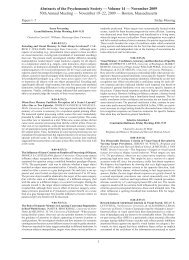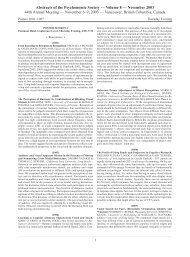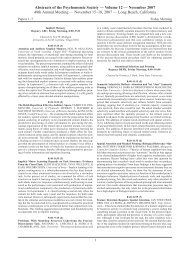Abstracts 2005 - The Psychonomic Society
Abstracts 2005 - The Psychonomic Society
Abstracts 2005 - The Psychonomic Society
You also want an ePaper? Increase the reach of your titles
YUMPU automatically turns print PDFs into web optimized ePapers that Google loves.
Posters 3085–3090 Friday Evening<br />
learners, especially given the absence of invariant cross-linguistic<br />
cues. However, studies using artificial language streams indicate that<br />
infants and adults can use statistics to correctly segment words from<br />
the speech stream. To date, studies have utilized a single input language.<br />
However, since bilingualism is common worldwide, it is crucial<br />
to determine how multiple language input might be segmented.<br />
Our study addresses this issue by employing artificial language<br />
streams to simulate the earliest stages of segmentation in adult L2<br />
learners. In three experiments, we required participants to track multiple<br />
sets of statistics for two artificial languages. <strong>The</strong> results demonstrate<br />
that adult learners can track two sets of statistics simultaneously,<br />
suggesting that they can form multiple representations when confronted<br />
with bilingual input. This work addresses a central issue in<br />
bilingualism research—namely, determining at what point listeners<br />
can form multiple representations when exposed to multiple languages.<br />
• DISCOURSE PROCESSES •<br />
(3085)<br />
Idiom Familiarity and Semantic Decomposition: Evaluating a Hybrid<br />
Model of Idiom Processing. MAYA LIBBEN & DEBRA A.<br />
TITONE, McGill University (sponsored by Debra A. Titone)—<strong>The</strong><br />
hybrid model of idiom comprehension (Titone & Connine, 1999) hypothesizes<br />
that semantic decomposition effects decrease as idiom familiarity<br />
increases. We evaluated this hypothesis in a study where native<br />
English-speaking participants rated 221 “verb the noun” idioms<br />
(e.g., meet your maker) on several linguistic dimensions, including familiarity,<br />
meaningfulness, global decomposability, and decomposability<br />
of the verb and the noun individually (n = 30 per dimension).<br />
Multiple regression analyses indicated that global decomposability<br />
ratings significantly predicted meaningfulness for low-familiar idioms,<br />
but not for moderately or highly familiar idioms. Moreover,<br />
when global decomposability was partitioned into that of the noun or<br />
the verb individually, noun, but not verb, decomposability significantly<br />
predicted meaningfulness. <strong>The</strong>se data suggest that semantic decomposition,<br />
largely driven by nouns in “verb the noun” idioms, occurs<br />
for low-familiar idioms that do not benefit from a robust phrasal<br />
representation. Speeded meaningfulness judgments are being obtained<br />
to determine whether these effects extend to online processing.<br />
(3086)<br />
On Reversing the Topics and Vehicles of Metaphor. JOHN D. CAMP-<br />
BELL & ALBERT N. KATZ, University of Western Ontario (sponsored<br />
by Albert N. Katz)—Class inclusion theory asserts that one cannot reverse<br />
the topic and vehicle of a metaphor and still produce a meaningful<br />
metaphor based on the interpretive ground found for the<br />
metaphor in its canonical order. In two studies, we test that claim. We<br />
replicate the seminal study that provided support for the claim but now<br />
add conditions that place both canonical and reversed metaphors in<br />
discourse contexts supporting the interpretive ground used to interpret<br />
the canonical metaphors (Study 1). In Study 2, online processing of<br />
the metaphors in context were examined in a word-by-word reading<br />
task. Both studies indicate that metaphors can be reversed, contrary<br />
to claims of class inclusion theory. Nonreversibility cannot be taken<br />
as a necessary condition of metaphor.<br />
(3087)<br />
Representations of Argument Predicates. CHRISTOPHER KURBY &<br />
M. ANNE BRITT, Northern Illinois University, & CHRISTOPHER R.<br />
WOLFE, Miami University (sponsored by Christopher R. Wolfe)—<br />
While reading, people create multiple levels of representation simultaneously:<br />
a verbatim and a gist representation (Kintsch & van Dyke,<br />
1978). According to the fuzzy trace theory, people reason from the<br />
least precise level that they can—that is, the most gist-like representation<br />
(Brainerd & Reyna, 1992). Despite the need for precision in<br />
representing argument, we found that undergraduates relied on a gist<br />
representation. Approximately 28% of the time, they could not state<br />
the specific predicate of the claim (i.e., stance) to which they had just<br />
100<br />
made an agreement or quality judgment. We rule out several alternative<br />
explanations (e.g., near-perfect recall of argument themes and<br />
event predicates). This lack of precision is specific to stances and, we<br />
believe, is a result of underdeveloped argumentation schemas (in the<br />
vein of pragmatic reasoning schemas and thematic frames). We present<br />
an analysis of several stance schema, such as legalize and harmful.<br />
(3088)<br />
Factors Influencing Cross-Language Word Transfer in Bilingual Text<br />
Processing. DEANNA FRIESEN & DEBRA JARED, University of<br />
Western Ontario (sponsored by Debra Jared)—<strong>The</strong> present study investigated<br />
bilinguals’ mental representations of texts, using a repeated<br />
reading paradigm. Specifically, it examined whether the memory representation<br />
formed after a text is read in one language includes surface<br />
form information that is available when a subsequent text is read<br />
in another language and whether such transfer depends on a repeated<br />
story context and second-language skill. Target words were cognates,<br />
which have the same surface form and meaning in two languages.<br />
Skilled and novice English–French bilinguals’ eye movements were<br />
tracked while they read five pairs of passages. Passages overlapped<br />
completely (language, story, words), in story and target cognates, in<br />
story only, in target cognates only, or not at all. Fixation latencies on<br />
cognates in the second passages in each pair depended on the nature<br />
of the overlap between passages in a pair, the language of the second<br />
passage, and second language skill. <strong>The</strong>se results suggest that surface<br />
form information from a passage read in one language can influence<br />
subsequent reading in another language in some circumstances.<br />
(3089)<br />
<strong>The</strong> Influence of Partner-Specific Memory Associations on Picture<br />
Naming. WILLIAM S. HORTON, Northwestern University—According<br />
to the memory-based view of common ground (Horton & Gerrig, <strong>2005</strong>),<br />
conversational partners automatically cue the retrieval of partnerspecific<br />
information from memory. In two experiments, this claim was<br />
tested by having participants first complete a task during which each<br />
of two partners provided category clues (“a bird”) to help solve a series<br />
of visual word fragments (O_T_IC_). <strong>The</strong>n, participants named a<br />
series of pictures in the presence of each partner, and the current partner<br />
was either the same or a different individual as the person associated<br />
with each critical picture label (e.g., ostrich). A final memory test<br />
asked participants to identify the partner with whom they had seen the<br />
critical words during the first task. Participants were fastest to produce<br />
names associated with the current partner, and such partner-specific<br />
priming was not correlated with source recall. Domain-general implicit<br />
memory mechanisms can make partner-relevant information more immediately<br />
accessible during language processing.<br />
(3090)<br />
Impact of Speaker Coordination Varies With Speaker Perspective:<br />
Evidence From Request-to-Commit Dialogues. PAUL C. AMRHEIN,<br />
Montclair State University—<strong>The</strong> influence of perspective taking on the<br />
illocutionary strength of performative speech acts under conditions of<br />
variable speaker coordination was investigated. Participants judged<br />
speaker committedness (Experiment 1) or speaker imposition (Experiment<br />
2) for request-to-commit dialogues; requesting verbs (e.g., ask,<br />
suggest, challenge, demand) and committing verbs (e.g., promise, agree,<br />
hope, guess) were systematically varied. Judgments were made from the<br />
requester’s or committer’s perspective. Results supported the posited independent<br />
contribution of speaker intentions (e.g., ±desire, ±ability) for<br />
requesting verbs (denoting requester-perceived enablers of, or obstacles<br />
to, the committer making an ideal verbal commitment) and committing<br />
verbs (denoting committer-acknowledged enablers or obstacles). Extent<br />
of mismatch in intention polarity between requesting and committing<br />
verbs reduced verb distinctiveness, especially from the committer’s perspective.<br />
When interverb intention polarity matched, speaker perspectives<br />
exhibited congruent judgments. <strong>The</strong>se findings demonstrate how<br />
variance in speaker coordination can arise through conveyed verb meaning<br />
and how its impact depends on speaker agenda.





